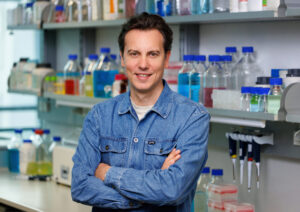Gene regulatory mechanisms in the launch process of T cell development
We’re honoured to welcome Dr. Ellen Rothenberg, Edward B. Lewis Professor of Biology at Caltech, for a special research seminar.
Events
Calendar

- This event has passed.
SBME Research Seminar: Human blastoids for modeling early pregnancy: A gene regulatory innovation underlying the evolution of human blastocyst implantation – Dr. Nicolas Rivron
SBME Research Seminar: Human blastoids for modeling early pregnancy: A gene regulatory innovation underlying the evolution of human blastocyst implantation – Dr. Nicolas Rivron</font color>
Seminar Abstract:
The blastocyst is the early mammalian organism before implantation in the uterus. We have promoted the self-organization of stem cells into models of mouse and human blastocysts, which we have named blastoids (Nature 2018, Nature 2021). Blastoids are morphologically and transcriptionally similar to the blastocyst and contain analogs of all three cell types that would eventually develop into the complete organism (embryonic and extraembryonic). Because blastoids are complete and model the preimplantation stage, they can be introduced into the uterus (mouse model) or combined in vitro with uterine cells (human model) to recapitulate aspects of the normally hidden implantation processes. Unlike blastocysts, blastoids come in large numbers and facilitate a more systematic modulation and analysis of development. As such, they represent both a scientific and ethical alternative to the use of embryos for research. Using this approach, we are investigating the genome evolution underlying species-specific aspects of blastocyst development and implantation, with the long-term goal of understanding the evolutionary basis of human pregnancy characteristics (50% of fertilized eggs never develop). This knowledge could help solve the global health problems of family planning, fertility decline and prenatal preventive medicine.

Dr. Nicolas Rivron’s Biography:
Nicolas Rivron is a group leader at the Institute for Molecular Biotechnologies of the Austrian Academy of Sciences (Vienna, Austria). He led the development of the first complete embryo model. It reflects the blastocyst in mice (2018, Nature) and humans (2021, Nature) and is named blastoid. Blastoids are unique in two respects: they are complete and they represent the pre-implantation stage thereby enabling implantation in utero. Using blastoids, the Rivron lab explores (1) the conserved principles of embryonic self-organization, especially the coordination and pacing of molecular and mechanical signalings in the context of human heterochronies, and (2) the human genetic traits that have led to our low fecundity compared to other primates (50% of fertilized oocytes never develop). This fundamental research aims to uncover the evolutionary constraints and vulnerabilities of human embryogenesis, knowledge of which is necessary for the development of novel therapeutic approaches to global health challenges such as family planning, fertility decline and prenatal preventive medicine.
Location:
This seminar is virtual.